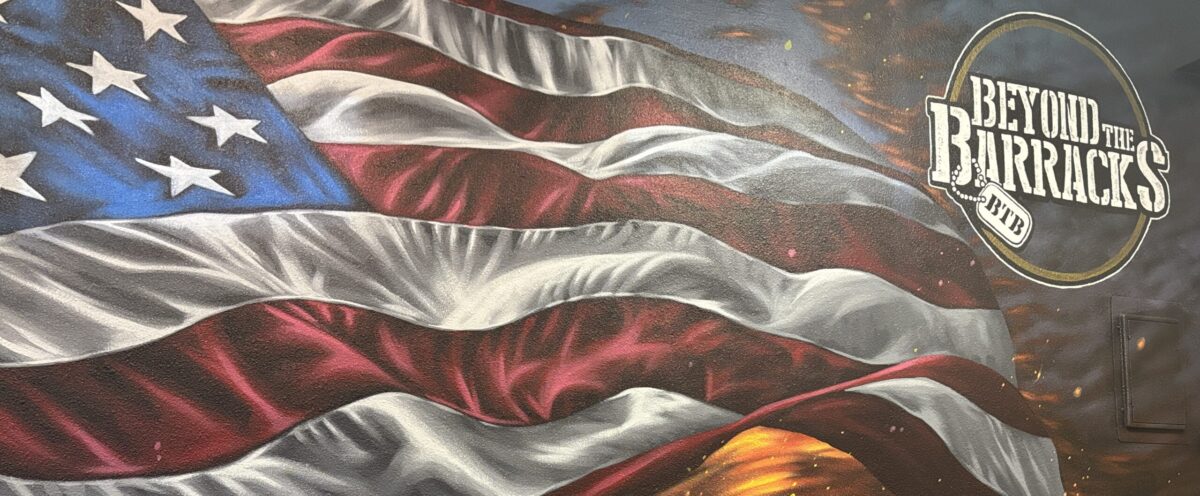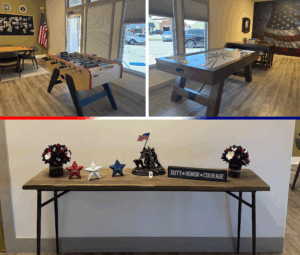
Photo by Ben Hensley | The new Beyond the Barracks building features furniture donated by Lennar Homes, a pool table and other entertainment and a mural created by local artist Jonathan Lopez.
Written by Ben Hensley
Growing up in a military family, Brandi Asacker feels her mission comes straight from the top: to connect veterans in the Central Valley and beyond through camaraderie, accountability and healing.
Now, after nearly a decade of work, Asacker’s nonprofit — Beyond the Barracks — looks to do just that with a new home and look.
While Beyond the Barracks was registered as a nonprofit in 2023, Asacker’s volunteer work in the military community reaches far beyond a few years; born on a Coast Guard base in Kodiak, Alaska, Asacker’s grandfather served in the Korean War and her father in the Coast Guard.
Growing up, Asacker saw early the struggles that shape the lives of returning veterans.
“I saw many different versions of my grandfather,” she said. “My uncles both served as well, and I saw their trials and tribulations and what they went through once they got home.”
In addition to witnessing her grandfather’s struggles, Asaker’s father battled with drugs and alcohol. She believes her father’s challenges were related to his time in the service.
With roots driven deep into the soil of the military community, Asacker’s bond with the military only grew stronger when she attended Buchanan High School. Always holding a strong military heritage, the school saw eight servicemen killed in the line of service from 2004 to 2010. Known as the “Buchanan Eight,” they joined the hundreds of California servicemembers killed in the Iraq and Afghanistan wars.
Around 2013, Asacker’s connection to the military took a heightened priority; she began putting together care packages for servicemembers.
“That’s what started me volunteering within the military community,” she said. “It was during that time when people that I knew came home.”
Shortly after she began volunteering, she saw veterans she once knew return home from service with anger, anxiety, depression and a number of other emotions that they did not outwardly display before deployment.
That was when she realized that, for many veterans, specifically younger ones, there was a lack of applicable and interactive services bringing veterans together.
“It was the first time I really looked at our community as a whole and said, ‘there’s so many places for Vietnam [War] guys…where is my generation of guys? Where do my guys go?’” she said.
Eventually, Asacker’s desire to serve led her to form Beyond the Barracks. Initially starting as a support group, the organization has evolved throughout the years to support veterans in 13 different states from Maine to Utah, but primarily, right here in the Central Valley.
Now, two years after its birth, Beyond the Barracks has been able to lay claim to its own home — a center in Old Town Clovis that will serve as everything from a gathering hub to a place of quiet reflection and support for combat- and non-combat veterans of any war.

But regardless of the specific function for an individual’s needs, the center will serve as one thing in particular: a home away from home for veterans in need of their own space.
“That’s why this space is not for anybody else,” she said. “When you walk in this room you already have somebody who at some point has some relatability to you. When you’re out in the real world, you don’t necessarily have that.”
Asacker said that the connection between veterans who may be suffering from Post Traumatic Stress Disorder and other struggles in life must be durable enough to save lives.
“Everything I do, it’s very simple — it is suicide prevention,” she said. “Every man in here, at one point, was a stranger and now, there’s accountability.”
Asacker explained that often the shock of lacking a support system in post-military life is one of the biggest challenges for veterans. In service, veterans form cohesive units — units that dissipate when veterans return home, creating a challenge and feeling of isolation.
Asacker, who hosts two breakfasts monthly at Beyond the Barracks, said that in just one of many examples, a veteran had missed several breakfasts in a row.
“I had four veterans within a span of a week reach out to him,” she said. “That’s your battle buddy check.”
The veteran, who was struggling and isolated for 10 days, underwent a challenging time, neglecting his own physical health at the expense of his mental health.
The veterans who connected with him through Beyond the Barracks rallied to support him, bringing food, essentials and providing a strong sense of brotherhood.
The new center, located at 325 Clovis Ave. Ste. 106, in Clovis, features just over 1,500 square feet of space for veterans to be themselves. Last year the nonprofit served 387 veterans in a number of different ways. With the new center, Beyond the Barracks will be able to expand its reach even more.
The facility features recreational games, a pool table, air hockey, foosball, an Xbox and board games, and will soon include a coffee bar and resource center.

Though not fully open, veterans already stop in to “get a space away from the world,” Asacker said.
With an annual operating budget of about $180,000, the nonprofit relies heavily on local and national sponsors; Black Rifle Coffee Company, Lennar Homes, BMW of Fresno, Clovis Truck Center and Core Medical are just some of many supporters, committing funds for everything from donut-and-coffee days that run around $700 to host, to the nonprofit’s annual Hawaii hiking retreat for six veterans, a trip that can run close to $7,000.
“The thing with a nonprofit is your money constantly has to be turning,” Asacker said. “You cannot save money in a nonprofit.”
And with that in mind, its full-commitment forward for Asacker, who hopes the new center will help close the gap between veterans in need and veterans served, adding that Beyond the Barracks does its best to craft a welcoming and supportive environment for the country’s honored warriors.
Asacker added that Beyond the Barracks’ registration is simple — just a name, date of birth and service history.
“It’s not like, ‘Here. Fill out a bunch of paperwork and then I’ll listen to your problems,’” she said. “Come in. We’ll talk.”








